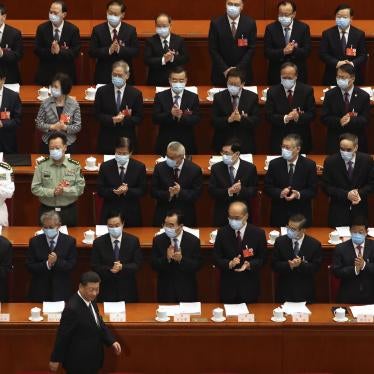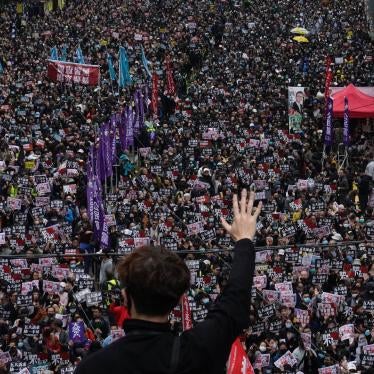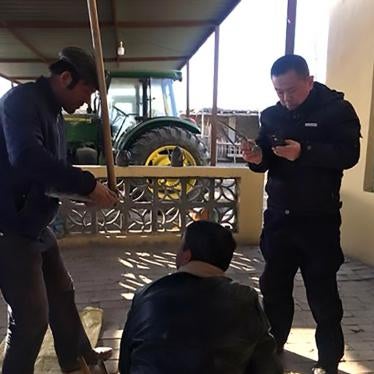(New York) – Hong Kong’s and China’s governments should reverse measures threatening the fundamental rights of people in Hong Kong, Human Rights Watch said today on the first anniversary of mass protests in the city. On June 9, 2019, over one million Hong Kong people marched peacefully against a proposed law that would allow Hong Kong authorities to transfer criminal suspects to China, where they would face a grossly unfair criminal justice system.
Following months of protests, the Hong Kong government scrapped the proposal in September, but Hong Kong and Beijing have since accelerated their efforts to suppress freedoms in the territory. In May 2020, the Chinese government announced it will impose draconian “national security” legislation on Hong Kong.
“For the past year Hong Kong people have made clear their peaceful demands for freedom and autonomy,” said Sophie Richardson, China director. “But the authorities in Beijing and Hong Kong choose to respond with ever-greater repression and violence.”
Between June and December 2019, at least two million people in Hong Kong – a city of seven million – repeatedly filled the streets to demand respect for their rights. Although the vast majority of protesters acted peacefully, Hong Kong police frequently dispersed them with excessive force. Suspected gang, or “triad,” members and pro-government demonstrators also repeatedly attacked protesters and pro-democracy lawmakers. Some protesters used violence, throwing Molotov cocktails at police.
In May, Hong Kong’s Independent Police Complaints Council, which United Nations human rights experts have criticized for lacking independence, largely exonerated police accused of using excessive force.
The Hong Kong government has rejected most of the protesters’ central demands, including for genuine universal suffrage as specified in Hong Kong’s functional constitution and in international law, and to open an independent and impartial investigation into police abuses. Since June 2019, the authorities have arrested nearly 8,000 demonstrators, yet they have not prosecuted any police officers credibly alleged to have used excessive force.
Instead of addressing the protesters’ legitimate concerns, the Hong Kong and Beijing governments have called the protests “riots,” and the protesters a “political virus” backed by “foreign forces.” In May 2020, Beijing adopted a decision to impose national security legislation without providing Hong Kong people or their elected representatives an opportunity to review and debate the law, in violation of the Basic Law. The resulting legislation is likely to have wide-ranging impact on Hong Kong, making it difficult for people to exercise the many freedoms they have long experienced. Instead, exercising these freedoms could be treated as subversion.
Hong Kong people and civil society groups have mobilized to oppose the law, with protests, strikes, and signature campaigns planned in the coming weeks. Foreign governments, including the European Union, United Kingdom, and United States, have voiced strong concerns about the national security legislation.
Governments should take concrete actions to help protect the rights of people in Hong Kong. They should sanction senior Beijing and Hong Kong officials responsible for recent human rights violations in Hong Kong and future abuses under the national security legislation, subjecting them to travel bans and asset freezes.
They should also offer a safe haven to Hong Kong people who suffer retaliation for exercising their human rights. They should commit resources to monitor Hong Kong’s deteriorating freedoms as a result of the national security legislation. They should also examine areas of freedom that Hong Kong people still have – for example, an open internet – and develop strategies to protect them.
“The global failure to respond to China’s aggressive rights abuses from Xinjiang to Hong Kong have only emboldened the Chinese government,” Richardson said. “Foreign governments catalyzed by this grave threat to freedoms in Hong Kong should act swiftly to press Beijing over its human rights violations.”
|
News Release
Hong Kong: Rights Under Attack on Anniversary
Beijing’s ‘National Security’ Law Threatens Basic Freedoms
Your tax deductible gift can help stop human rights violations and save lives around the world.
Region / Country
Tags
Most Viewed
-
November 25, 2019
A Dirty Investment

-
April 27, 2021
A Threshold Crossed

-
May 12, 2025
The Gig Trap

-
January 23, 2018
Hidden Chains

-
September 30, 2024
“They Destroyed What Was Inside Us”





